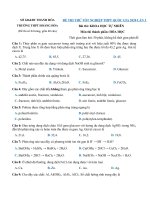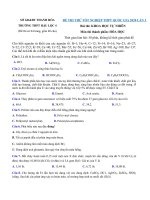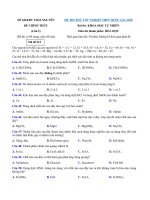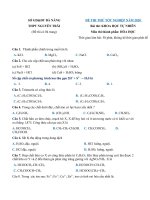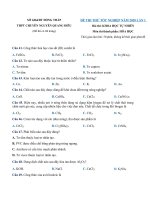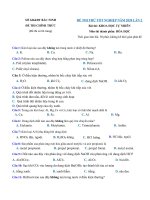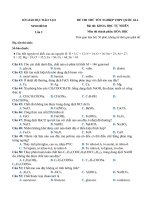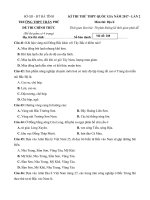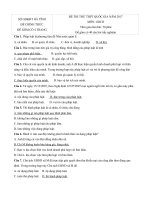Tải Đề thi thử thpt quốc gia 2021 môn Anh trường THPT Tiên Du lần 1 - Đề thi thử thptqg 2021 môn Anh có đáp án
Bạn đang xem bản rút gọn của tài liệu. Xem và tải ngay bản đầy đủ của tài liệu tại đây (137.71 KB, 8 trang )
<span class='text_page_counter'>(1)</span><div class='page_container' data-page=1>
<b>ĐỀ THI THỬ THPTQG MÔN TIẾNG ANH</b>
<b>NĂM 2021 CÓ ĐÁP ÁN</b>
<i><b>Mark the letter A, B, C, or D on your answer sheet to indicate the correct answer to each of </b></i>
<i><b>the following questions.</b></i>
<b>Question 1. New Zealand was the first country ______ women to vote.</b>
<b> A. that give</b> <b>B. to give</b> <b>C. gave</b> <b>D. giving</b>
<b>Question 2. He got a bad mark. He _____have prepared the lesson carefully.</b>
<b> A. shouldn’t </b> <b> B. wouldn’t</b> <b> C. should</b> <b>D. would </b>
<b>Question 3. _____ they do not have much experience, their applications have been approved.</b>
<b> A. So that</b> <b>B. Although</b> <b>C. Because </b> <b>D. As soon as</b>
<b>Question 4. The accused ______ guilty to all charges</b>
<b> A. confessed</b> <b>B. pleaded</b> <b>C. said</b> <b>D. admitted</b>
<b>Question 5. The newspaper did not mention the ________ of the damage caused by the fire</b>
<b> A. amount</b> <b>B. range</b> <b>C. quality</b> <b>D. extent</b>
<b>Question 6. If I ______ to the store later, I’ll get you some milk.</b>
<b> A. was going</b> <b>B. went</b> <b>C. go</b> <b>D. will go</b>
<b>Question 7. Scientist are now beginning to conduct experiments on _____ trigger different sorts</b>
of health risks.
<b> A. noise pollution can</b> <b>B. how noise pollution</b>
<b> C. how noise pollution can </b> <b>D. that noise pollution</b>
<b>Question 8. Sportsmen ______ their political differences on the sports field.</b>
<b> A. put aside</b> <b>B. take apart</b> <b>C. take place</b> <b>D. keep apart</b>
<b>Question 9. It is _____ funniest book that I have ever read.</b>
<b> A. an</b> <b>B. the</b> <b>C. a</b> <b>D. X</b>
<b>Question 10. With greatly increased workloads, everyone is ______ pressure now</b>
<b> A. out of</b> <b>B. above</b> <b>C. under</b> <b>D. upon</b>
<b>Question 11. After you ______ your exam, I will take you out to eat. Is it OK ?</b>
<b> A. were finishing </b> <b>B. finished </b> <b>C. have finished </b> <b>D. are finishing</b>
<b>Question 12. I’ve never really enjoyed going to the ballet of the opera; they’re not really my </b>
</div>
<span class='text_page_counter'>(2)</span><div class='page_container' data-page=2>
<b> A. cup of tea</b> <b>B. biscuit</b> <b>C. sweets and candy</b> <b>D. piece of cake</b>
<b>Question 13. The phone suddenly _____ while Joanna _____ the housework.</b>
<b> A. rang – did</b> <b>B. was ringing – did C. was ringing – was doing D. rang – was doing</b>
<b>Question 14. We hung coloured lights around the room for _____. </b>
<b> A. decorative</b> <b>B. decoration</b> <b>C. decorate</b> <b>D. decorator</b>
<b>Question 15. It is important that he _____ into a good university.</b>
<b> A. gets</b> <b> B. getting</b> <b> C. get</b> <b>D. got</b>
<i><b>Mark the letter A, B, C, or D on your answer sheet to indicate the underlined part that needs </b></i>
<i><b>correction in each of the following questions.</b></i>
<b>Question 16. It was an interested book that I bought at Ngoc Binh Store last Sunday</b>
<b> A. interested </b> <b>B. last Sunday</b> <b>C. at</b> <b>D. that</b>
<b>Question 17. The world is becoming more industrialized and the number of animal species</b>
that have become extinct have increased.
<b> A. extinct</b> <b>B. industrialized</b> <b>C. species</b> <b>D. have</b>
<b>Question 18. Dams are used to control flooding, provide water for irrigation, and generating</b>
electricity for the surrounding area.
<b> A. to control flooding </b> <b>B. generating</b>
<b> C. surrounding area</b> <b>D. irrigation</b>
<i><b>Mark the letter A, B, C or D to indicate the word(s) CLOSEST in meaning to the underlined</b></i>
<i><b>word(s) in each of the following questions.</b></i>
<b>Question 19. The Association of Southeast Asian Nations, or ASEAN, was established on 8 </b>
August 1967 in Bangkok, Thailand, with Indonesia, Malaysia, Philippines, Singapore and
<b>Thailand, joining hands initially.</b>
<b> A. officially</b> <b>B. basically</b> <b>C. firstly</b> <b>D. lastly</b>
<b>Question 20. If the examiner can't make sense of what your essay is about, you'll get the low</b>
mark.
<b> A. communicate</b> <b>B. estimate </b> <b>C. declare</b> <b>D. understand </b>
<i><b>Mark the letter A, B, C, or D on your answer sheet to indicate the word that differs from the </b></i>
<i><b>other three in the position of primary stress in each of the following questions</b></i>
<b>Question 21. </b> <b>A. climate</b> <b>B. greenhouse</b> <b>C. footprint D. </b>
upset
</div>
<span class='text_page_counter'>(3)</span><div class='page_container' data-page=3>
consequence
<i><b>Mark the letter A, B, C, or D on your answer sheet to indicate the sentence that is closest in</b></i>
<i><b>meaning to each of the following questions.</b></i>
<i><b>Question 23. My father is less friendly than my mother.</b></i>
<b> A. My father is not as friendly as my mother. </b>
<b> B. My father is more friendly than my mother.</b>
<b> C. My mother is not as friendly as my father. </b>
<b> D. My mother is less friendly than my father.</b>
<i><b>Question 24. “I bought these books last week”. He said </b></i>
<b> A. He said he had bought these books last week.</b>
<b> B. He said he had bought those books the week before.</b>
<b> C. He said he bought these books last week. </b>
<b> D. He said he bought these books the week before.</b>
<i><b>Question 25. She probably buys this house next week.</b></i>
<b> A. She doesn’t have to buy this house next week.</b>
<b> B. She may buy this house next week.</b>
<b> C. She should buy next house next week.</b>
<b> D. She must buy this house next week.</b>
<i><b>Mark the letter A, B, C, or D on your answer sheet to indicate the sentence that is combines</b></i>
<i><b>each pair of sentences in the following questions.</b></i>
<i><b>Question 26. You can stay in the flat for free. You pay the bills.</b></i>
<b> A. Without the bills paid, you can stay in the free flat.</b>
<b> B. Unless the flat is free of bills, you cannot stay in it.</b>
<b> C. Whether you pay the bills or stay in the flat, it is free.</b>
<b> D. Provided you pay the bills, you can stay in the flat for free. </b>
<i><b>Question 27. It is such an interesting book. I have read it three times </b></i>
<b> A. Such was the interesting book that I have read it three times.</b>
<b> B. Such interesting was book that I have read it three times.</b>
<b> C. Should the book be interesting, I have read it three times.</b>
<b> D. Only if it is an interesting book have I read it three times.</b>
</div>
<span class='text_page_counter'>(4)</span><div class='page_container' data-page=4>
In Africa, people celebrate with joy the birth of a new baby. The Pygmies would sing a birth-song
to the child. In Kenya, the mother takes the baby strapped to her back into the thorn enclosure where
the cattle are kept. There, her husband and the village elders wait to give the child his or her name.
In West Africa, after the baby is eight days old, the mother takes the baby for its first walk in the
big, wide world, and friends and family are invited to meet the new baby. In various African nations,
they hold initiation ceremonies for groups of children instead of birthdays. When children reach a
certain designated age, they learn the laws, beliefs, customs, songs and dances of their tribes. Some
African tribes consider that children from nine to twelve are ready to be initiated into the grown up
world. They may have to carry out several tests.
<b> Maasai boys around thirteen years old to seventeen undergo a two-stage initiation. The first stage</b>
lasts about three months. The boys leave their parents' homes, paint their bodies white, and are taught
how to become young warriors. At the end of this stage, they have their heads shaved and they are
also circumcised. At the second stage, the young warriors grow their hair long and live in a camp
called a “manyatta” where they practice hunting the wild animals that might attack the Maasai herds.
<b>This stage may last a few years. When they are ready, they will marry and become owners of large</b>
cattle herds like their fathers. The girls are initiated when they are fourteen or fifteen. They are taught
by the older women about the duties of marriage and how to care for babies. Soon after that they are
married and lead a life similar to that of their mothers.
<b>Question 28. What does the word "they" in paragraph 3 refer to? </b>
<b> A. the young warriors </b> <b>B. the cattle owners</b>
<b> C. the Maasai herds </b> <b>D. the wild animals </b>
<b>Question 29. The word "undergo" in paragraph 3 is closest in meaning to ______________.</b>
<b> A. explore</b> <b>B. participate in </b> <b>C. experience </b> <b>D. commence </b>
<b>Question 30. Which of the following is NOT mentioned in paragraph 2? </b>
<b> A. Children have to learn their tribes' cultures and traditions when they are old enough. </b>
<b> B. An eight-day-old child will be taken for the first walk by his or her mother. </b>
<b> C. Children are initiated for a mature life in the presence of their friends and family. </b>
<b> D. Children have to overcome a few trials to enter the grown-up world. </b>
<b>Question 31. Where do people in Kenya give the name to the child? </b>
<b> A. at their house </b> <b>B. at the village church</b>
</div>
<span class='text_page_counter'>(5)</span><div class='page_container' data-page=5>
<b> A. Birthday ceremonies for children in Africa </b>
<b> B. Activities in a birth celebration</b>
<b> C. Traditions of Maasai people when having a new baby </b>
<b> D. Celebrations in Africa</b>
<i><b>Choose the word that has the underlined part pronounced differently from that of the others.</b></i>
<b>Question 33. </b> <b>A. worked</b> <b>B. trained </b> <b>C. stopped D. </b>
missed
<b>Question 34. </b> <b>A. dynasty</b> <b>B. royal</b> <b>C. intact</b> <b>D. </b>
citadel
<i><b>Mark the letter A, B, C, or D on your answer sheet to indicate the option that best completes</b></i>
<i><b>each of the following exchanges.</b></i>
<i><b>Question 35. Linda and Peter are talking about safe driving.</b></i>
<i><b> ~ Linda: “I think drink-driving should be severely punished.”</b></i>
<i><b> ~ Peter "... . It may cause accidents or even deaths.”</b></i>
<b> A. I don’t understand what you mean. </b> <b>B. I don’t think so.</b>
<b> C. I absolutely agree with you.</b> <b>D. You must be kidding.</b>
<i><b>Question 36. A porter is talking to Mary in the hotel lobby.</b></i>
<i><b> ~ Porter: “May I help you with your suitcase?”</b></i>
<i><b> ~ Mary: “...”</b></i>
<b> A. You’re welcome.</b> <b>B. What a shame!</b> <b>C. Yes, please.</b> <b>D. Me too.</b>
<i><b>Read the following passage and blacken the letter A, B, C, or D on your answer sheet to</b></i>
<i><b>indicate the correct answer to the following questions.</b></i>
<b> Foot racing is a popular activity in the United States. It is seen not only as a competitive sport</b>
but also as a way to exercise, to enjoy the camaraderie of like-minded people, and to donate
<b>money to a good cause. Though serious runners may spend months training to compete, other</b>
runners and walkers might not train at all. Those not competing to win might run in an effort to
beat their own time or simply to enjoy the fun and exercise. People of all ages, from those of
less than one year (who may be pushed in strollers) to those in their eighties, enter into this
sport. The races are held on city streets, on college campuses, through parks, and in suburban
areas, and they are commonly 5 to 10 kilometers in length.
</div>
<span class='text_page_counter'>(6)</span><div class='page_container' data-page=6>
ends on the west side at the Pacific Ocean. There may be 80,000 or more people running in this
race through the streets and hills of San Francisco. In the front are the serious runners who
compete to win and who might finish in as little as 34 minutes. Behind them are the thousands
20 who take several hours to finish. In the back of the race are those who dress in costumes and
come just for fun. One year there was a group of men who dressed like Elvis Presley, and
another group consisted of firefighters who were tied together in a long line and who were
carrying a fire hose. There was even a bridal party, in which the bride was dressed in a long
<b>white gown and the groom wore a tuxedo. The bride and groom threw flowers to bystanders,</b>
and they were actually married at some point along the route.
<b>Question 37. The phrase “to a good cause” could be best replaced by which of the following?</b>
<b> A. for an award</b> <b>B. for a good purpose</b>
<b> C. to reward the winner </b> <b>D. to protect a wise investment</b>
<b>Question 38. Which of the following best describes the organization of this passage?</b>
<b> A. cause and result </b> <b>B. specific to general</b>
<b> C. chronological order</b> <b>D. statement and example</b>
<b>Question 39. The word “activity” in the first paragraph is most similar to which of the </b>
following?
<b> A. motion</b> <b>B. pursuit</b> <b>C. expectation</b> <b>D. pilgrimage</b>
<b>Question 40. Which of the following is NOT mentioned in this passage?</b>
<b> A. Some runners were serious about winning.</b>
<b> B. Some runners were ready to put out a fire. </b>
<b> C. Some runners looked like Elvis Presley.</b>
<b> D. Some runners were participating in a wedding.</b>
<b>Question 41. Which of the following is NOT implied by the author?</b>
<b> A. Entering a race is a way to give support to an organization.</b>
<b> B. Running is a good way to strengthen the heart.</b>
<b> C. Foot races appeal to a variety of people.</b>
<b> D. Walkers can compete for prizes.</b>
<b>Question 42. The word “bystander” refers to __________.</b>
<b> A. a participant</b> <b>B. a judge</b> <b>C. a spectator</b> <b>D. a walker</b>
</div>
<span class='text_page_counter'>(7)</span><div class='page_container' data-page=7>
<b> B. describe a popular activity</b>
<b> C. encourage people to exercise</b>
<b> D. make fun of runners in costume</b>
<i><b>Mark the letter A, B, C or D to indicate the word(s) OPPOSITE in meaning to the underlined</b></i>
<i><b>word(s) in each of the following questions.</b></i>
<b>Question 44. Sorry, I can’t come to your party. I am snowed under with work at the moment.</b>
<b> A. relaxed about</b> <b>B. interested in</b> <b>C. busy with</b> <b>D. free from</b>
<b>Question 45. He was imprisoned because he revealed secrets to the enemies.</b>
<b> A. concealed</b> <b>B. betrayed</b> <b>C. declared</b> <b>D. disowned</b>
<i><b>Read the following passage and mark the letter A, B, C, or D on your answer sheet to indicate the</b></i>
<i><b>correct word or phrase that best fits each of the numbered blanks. </b></i>
The invention of the mobile phone has undoubtedly revolutionized the way people communicate
and influenced every aspect of our lives. The issue is whether this technological innovation has (46)
______ more harm than good. In order to answer the question, we must first turn to the types of
consumers. Presumably, most parents (47) ______ are always worrying about their children’s safety
buy mobile phones for them to track their whereabouts. We can also assume that most teenagers want
mobile phones to avoid missing out on social contact. In this context, the advantages are clear. (48)
________, we cannot deny the fact that text messages have been used by bullies to intimidate fellow
students. There is also (49) ________ evidence that texting has affected literacy skills.
The widespread use of mobile phone has, out of question, affected adult consumers too. What
employee, on the way home from work, would be reluctant to answer a call from their boss?
Apparently, only 18% of us, according to a survey, are willing to switch off our mobile phones once
we've left the office.
Admittedly, mobile phones can be intrusive but there are obvious benefits to possessing one.
Personally speaking, they are invaluable when it comes to making social or business arrangements at
short (50) _______. They also provide their owners with a sense of security in emergency situations.
<b>Question 46. </b> <b>A. brought </b> <b>B. played</b> <b>C. done</b> <b>D. </b>
made
<b>Question 47. </b> <b>A. whom</b> <b>B. what </b> <b>C. which </b> <b>D. </b>
who
<b>Question 48. </b> <b>A. Moreover</b> <b>B. Therefore</b> <b>C. However D. So </b>
</div>
<span class='text_page_counter'>(8)</span><div class='page_container' data-page=8>
<b>Question 49. </b> <b>A. arguable </b> <b>B. doubtless </b> <b>C. unhesitating </b>
<b>D. indisputable</b>
<b>Question 50. </b> <b>A. warning </b> <b>B. time </b> <b>C. term </b> <b>D. </b>
notice
<i><b> END </b></i>
<b>---ĐÁP ÁN</b>
<b>1</b> <b>B</b> <b>6</b> <b>C</b> <b>11</b> <b>C</b> <b>16</b> <b>A</b> <b>21</b> <b>D</b> <b>26</b> <b>D</b> <b>31</b> <b>C</b> <b>36</b> <b>C</b> <b>41</b> <b>B</b> <b>46</b> <b>C</b>
<b>2</b> <b>C</b> <b>7</b> <b>C</b> <b>12</b> <b>A</b> <b>17</b> <b>D</b> <b>22</b> <b>A</b> <b>27</b> <b>A</b> <b>32</b> <b>A</b> <b>37</b> <b>B</b> <b>42</b> <b>C</b> <b>47</b> <b>D</b>
<b>3</b> <b>B</b> <b>8</b> <b>A</b> <b>13</b> <b>D</b> <b>18</b> <b>B</b> <b>23</b> <b>A</b> <b>28</b> <b>A</b> <b>33</b> <b>B</b> <b>38</b> <b>D</b> <b>43</b> <b>B</b> <b>48</b> <b>C</b>
<b>4</b> <b>B</b> <b>9</b> <b>B</b> <b>14</b> <b>B</b> <b>19</b> <b>C</b> <b>24</b> <b>B</b> <b>29</b> <b>C</b> <b>34</b> <b>C</b> <b>39</b> <b>B</b> <b>44</b> <b>D</b> <b>49</b> <b>D</b>
<b>5</b> <b>D</b> <b>10</b> <b>C</b> <b>15</b> <b>C</b> <b>20</b> <b>D</b> <b>25</b> <b>B</b> <b>30</b> <b>C</b> <b>35</b> <b>C</b> <b>40</b> <b>B</b> <b>45</b> <b>A</b> <b>50</b> <b>D</b>
</div>
<!--links-->
